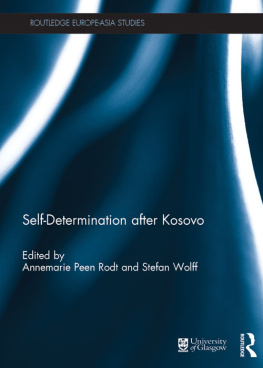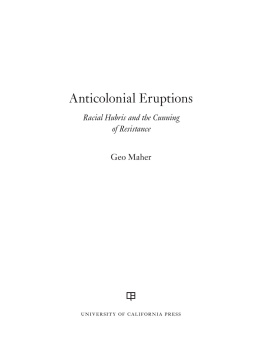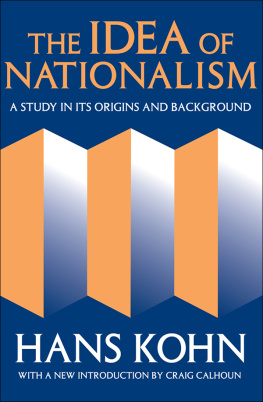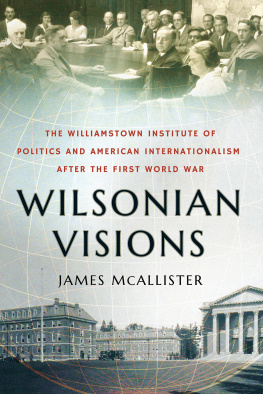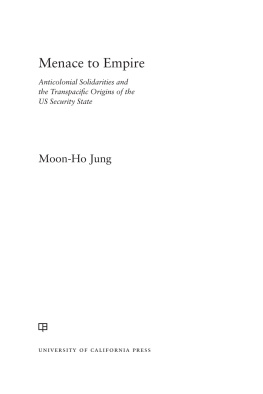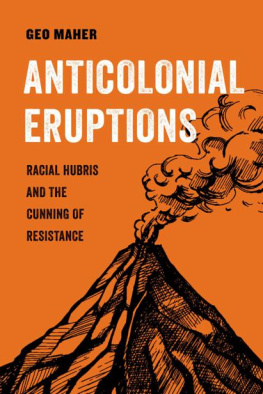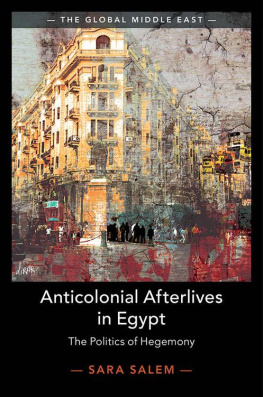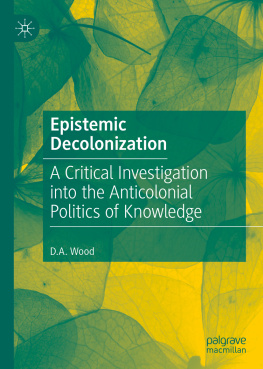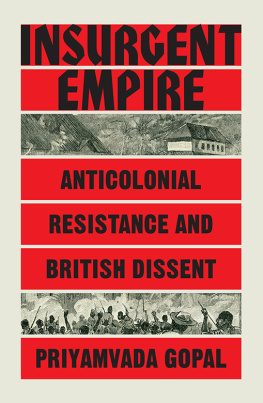The WILSONIAN MOMENT
The WILSONIAN MOMENT
Self-Determination and the International Origins of Anticolonial Nationalism
EREZ MANELA


Oxford University Press, Inc., publishes works that further
Oxford Universitys objective of excellence
in research, scholarship, and education.
Oxford New York
Auckland Cape Town Dar es Salaam Hong Kong Karachi
Kuala Lumpur Madrid Melbourne Mexico City Nairobi
New Delhi Shanghai Taipei Toronto
With offices in
Argentina Austria Brazil Chile Czech Republic France Greece
Guatemala Hungary Italy Japan Poland Portugal Singapore
South Korea Switzerland Thailand Turkey Ukraine Vietnam
Copyright 2007 by Erez Manela
Published by Oxford University Press, Inc.
198 Madison Avenue, New York, New York 10016
www.oup.com
Oxford is a registered trademark of Oxford University Press
All rights reserved. No part of this publication may be reproduced,
stored in a retrieval system, or transmitted, in any form or by any means,
electronic, mechanical, photocopying, recording, or otherwise,
without the prior permission of Oxford University Press.
Library of Congress Cataloging-in-Publication Data
Manela, Erez.
The Wilsonian moment: self-determination and the international
origins of anticolonial nationalism / Erez Manela.
p. cm.
Includes bibliographical references and index.
ISBN 9780-19517615-5
1. World War, 19141918Peace. 2. World War, 19141918Influence.
3. Nationalism. 4. EgyptHistoryInsurrection, 1919. 5. IndiaHistoryBritish
occupation, 17651947. 6. ChinaHistoryMay Fourth movement, 1919.
7. KoreaHistoryIndependence movement, 1919. 8. Wilson, Woodrow, 18561924. I. Title.
D645.M38 2007
320.540941dc22 2007005490
987654321
Printed in the United States of America
on acid-free paper
To
Bracha Manela
and the memory of
Yechiel Moshe Manela
and
Luba and Yitzhak Kornblit
It is not enough, I feel, to refer to these investigations as Tales of the Old Wrangler.
Granted, the appellation could be stretched to fit; but one might, with as much justification, condense the whole of human history to Anecdotes of the Famous and the Misguided.
David Mamet, Wilson: A Consideration of the Sources
PREFACE
This book began with an unexpected discovery. I had set out to write a paper on U.S. contacts with Egypt before World War II, since I suspected (and still do) that the single-minded focus on the postwar period in most histories of U.S. relations with the Middle East had left some important stones unturned, even undiscovered. I began going through the State Department files on Egypt starting with World War I, and immediately came across a telegram from the Egyptian nationalist icon Sad Zaghlul to Woodrow Wilson, lavishing praise on the U.S. president and beseeching him to support Egypts struggle for self-determination against Britain. I came upon one such message, and then another, and another. It soon became clear that the vast majority of the material on Egypt in the State Department files between the fall of 1918 and the spring of 1919 consisted of such documents: telegrams, letters, petitions, pamphlets, sent to Wilson not only by Zaghlul himself but by a long list of leading politicians, parties, professional organizations, womens groups, student groups, Egyptian organizations abroad, and even private Egyptian citizens, moved to write to the president of the United States as he arrived in Paris for the peace conference.
It was an intriguing discovery. I had seen no mention of this response to Wilson in the histories of Egyptian politics I had read, except perhaps in passing. I still wrote the paper on U.S.-Egyptian contacts in the interwar years, but also mentioned the discovery to a colleague, who in turn told me the famous story about the man who would later become known as Ho Chi Minh, who was in Paris at the time of the conference and also petitioned Wilson for support in the Indochinese struggle against France. But Ho and Zaghlul were not the only anticolonial nationalists in 1919 searching for new allies, languages, and methods in their quests to challenge imperialism. As I read more about this moment in the histories of other colonial societies, what came into focus was a story of a broad anticolonial nationalist upheaval that was inherently international. After all, it could not be an accident that the 1919 Revolution in Egypt, which erupted as the British tried to suppress Zaghluls activities, occurred simultaneously with the March First movement against Japanese rule in Korea, the launching of Gandhis satyagraha, or nonviolent resistance movement in India, and the anti-imperialist May Fourth movement in China. There was, I found, much already written about each event within the respective national historiographies, but no substantial attempt to place them all together within a single field of vision, to frame them, as I have come to see them, as component parts of a single historical moment.
There is, of course, no shortage of writings on the international history of the Paris Peace Conference of 1919. In the standard narrative of the peace conference, non-Western regions and peoples figure most often as inert masses of territory and humanity that the great powers carved up in an unprecedented expansion of imperialism.
Similar gaps exist, not surprisingly, in the literature on the U.S. role in the First World War and at the peace conference, with most of it focused on the interactions between the United States and its principal allies.
Such observations are part of the growing call among historians to internationalize the history of the United States. Moreover, in historical experience the attitudes of anti- and pro-Americanism are often closely related. As the history of the Wilsonian moment also shows, the roots of the former are firmly planted in the latter, feeding as they do on the fluctuating but ever-present gap between the promise of Americas rhetoric and ideals and the realities of its policies and practices.
Thinking about the Wilsonian moment in the colonial world also provides an unusual perspective on the history of anticolonialism and decolonization, surely among the most important historical processes of the twentieth century. Much of the history of anticolonial movements has been written as if it occurred solely within the boundaries of the emerging nation, or of the imperial enclosure from which it emerged. Thus, the history of the Indian nationalist movement is written as part of Indian history, or of British imperial history; the history of Chinese nationalism as part of the history of China, and so on. The circular logic of this practice is easy to exposeChinese nationalism in a sense produced China, and is therefore part of Chinese historybut it has not been easy to transcend. Nationalist histories have, of course, been challenged vigorously by historians of postcolonial societies, but such projects have tended to question the national and imperial frameworks by adopting subnational perspectives; that is, to historicize and denaturalize the national enclosure by breaking it down to its component parts, rather than by showing how it was forged in the first place within the broader context of international events.
When we expand our field of vision and place anticolonial nationalist histories within an international context, it is easy to see, as Prasenjit Duara observed, that after World War I, the circumstances for decolonization were generated as much from the international situation as any other.
Next page


